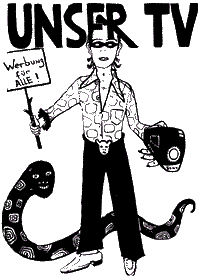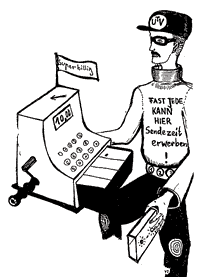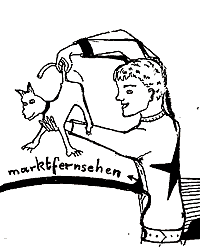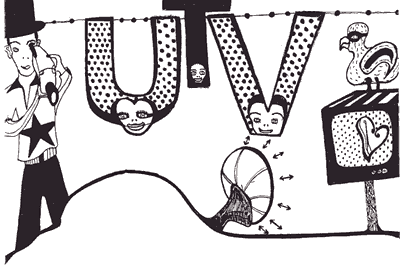TV-STATION
 |
INTERVIEW WITH THREE GERMANS:
#One: The first TV emerged in our village at the end of the sixties.
Sometimes up to 15 people gathered in front of the box. Soon the neighbours
got jealous and bought their own one. Suddenly everybody could see what
else was happening in the world, and after that day, the doors were locked.
#Two: One day, when I heard that my favourite programme, 'Jim Button and
the wild 13', would be on air, I was so happy I dived into the snow and
my head got stuck. Four years later, in '68, while we watched the street
fights on the news, my daddy said: 'Boy, if you are going to join them,
I'll kill you'.
#Three: I started with another riot, watching 'Mutiny on the Bounty',
but the film was always interrupted for the latest information on the
'Watergate scandal', which came out that night. During the news I always
had to leave the room and was allowed back in when the film continued.
Chorus: That was yesterday, today we want to make our own TV.
RULES OF THE GAME SO FAR
In the early eighties, the German government started to share its TV monopoly on entertainment and information with private companies. To compensate for the left's criticism on this capitalisation of information, one single channel was made accessible for everyone.
> PUBLIC ACCESS
1, 2, 3 think that you can have fun with public access. It is necessary
to keep it as a basis of a democratic pool, but it can't change (TV) reality,
because:
-There is mostly no programming structure to help the viewer find what
he/ she is interested in. So nobody is watching, and the information remains
marginalised.
-The user of this TV social welfare, public access, has to exploit himself
as a producer and again affirms the media hierarchies.
> SLOT-CULTURE & ARTE
In order to gain the licences to broadcast, providers have been assigned
to keep certain slots open for some kind of 'high-level' or 'non-commercial'
TV. These gaps are an alibi to cover the field of financial interests.
The slots are always pigeon-holed as art, which means you don't have to
take what you get seriously.
With the French-German collaboration of the ARTE channel we have a complete
'cultural ghetto', where the issue seems to be the cultivation of the
TV desert, but in fact it creates the level of a certain internationality,
which will be the standard in 'fortress Europe'.
> ALTERNATIVE VIDEO-DISTRIBUTION
We still think that the strategies of building up a net of counter-information
and culture in the seventies are highly important, but the attempt to
build a video-distribution network outside of and against TV failed. Archives,
activist-groups and discussions which still exist should be involved in
this idea of an autonomous TV station.
 |
A NEW FINANCING MODEL
How could a TV station finance itself and remain independent of government
subvention, advertising and sponsorship?
It is necessary to develop an autonomous economic structure that circulates
issues between viewers and producers more directly. The station should
be financed by a public that is not excluded from the production of the
programme.
FLEA MARKET TV
As with other TV stations, the only thing to sell is time. But to make
it affordable for everyone, we would sell it extremely cheap. Private
persons now could use the TV for messages or advertising, to offer, exchange
or look for things they need. Let it be a job, an apartment, furniture,
old cars or new companionship. Since it is visible, the commercial would
be more effective and more fun. No doubt, you don't have to walk through
twenty apartments, if you could take a glimpse on TV beforehand. This
daily 10 hour programme would be structured by Show View codes for taping,
so its easy to find what you need. A brief spot ad would cost less than
a small ad in a newspaper. Lets say one second on air would cost under
a pound, let's make it even 75p! For £ 22.50 you could get a 30
second clip, which is quite a lot of time for a TV commercial, and still,
it would be less than advertising in a paper. Selling 10 hours of TV time
like that for personal TV ads would make £ 27 000 a day, which means
£ 9 882 000 a year. An economic system like this would result in
having twenty times the budget of a 'public access' station and it could
finance an independent low-cost programme in the evenings and at night.
The alienation between viewer/ consumer and TV station/ producer is cut
short, money doesn't come in through the circulation of commodities and
miscellaneous intermediate trade, but through the viewers/ users, who
offer goods, labour or services directly - it will become their TV station.
INTERACTION
Our proposal wants to take interactive TV as a promise. This could not
mean offering a handful of buttons for some click-clack. In a one-way
medium like TV, interaction can only mean stepping on the other side of
the screen. We do not want a TV by experts and journalism about ..., but
a TV from ... people who do TV as well and live in the circumstances they
talk about.
PROGRAMMING
From the income of 10 hours of advertising a day we want to finance a
programme which tries include all those who were excluded from TV so far:
political activists, grassroots organisations, documentary filmmakers,
viewers-videoers, artists, no-names and many more. The editorial collective
would work on co-ordinating contributions and trying to connect different
parts of the public. Maybe it is still more of a network than a broadcasting
machine.
Giving away time on TV means distributing power, vanity and influence.
It is a political issue, who gives what to whom and why - Structures which
select and distribute should be criticised and made transparent. But democracy
can not be our programming structure, rather it is anarchy and chaos.
Here, everyone becomes a genius, welcome to the pleasuredome.
 |
EXAMPLES
It seems to be clear that a short introduction like this cannot give a
profound statement or insight into agendas and ideas. Furthermore, programming
depends on the editorial collectives, the given issues and up-to-date
decision-making.
EASY VIEWING
Screensavers from midnight to 4 am could be a wonderful genre. "Voices
from the Black Screen" is a public forum and party line. "Partypooper's
Handycam", the extreme, eccentric excesses of a society on ecstasy.
Escort your favourite Semi-Celebs "For a night in Metropolis",
the unedited tour with Mark Dion around New York or Yoko Ono in Tokyo...
Ambient TV: surveillance cameras and once in a while a bank robbery. Operations,
travelling through other bodies. Activities of an anthill at sunset...
LATE NIGHT SHOW ROOM
Since no one watches feature films on TV anymore, just videos, the off
time between
3 and 7 p.m. is used to show long-running films by artists. In order to
set your VCR properly you have to subscribe to our infopaper that tells
you what's going on in the world of avant-garde video: author and time,
date and title. This income will go directly to the authors.
NEWS
News in a station like this can not function as just another arbitrary
choice of daily events, loaded with meaning. We don't want to compete
in getting the kick out of the latest news. We have to question the significance
this has to create a subtext for us: how does it relate to you and me,
to the dominant powers? How can information be presented so it doesn't
paralyse us, but rather opens things up for possible action?
TOPICS OF THE WEEK
> On Monday night, an artist or an artist collective will apply their
artistic approach to the concept, structure and issues of the programme.
Here no concessions will be made to feature pages or common sense.
> No matter if my neighbour shoots a video about her dog or a biology
student reports on the woodlouse, not only on Tuesdays it is important
that these people get time on air and not Attenborough or Disney. Later,
we show "The World Disasters", a serial where the title is the
only stipulation.
> Wednesdays, all the programmes are in different languages, hosted
by those who suggested them. We have already planned features from Russia,
Scotland, Hungary and Korea.
> On Thursdays we have "Absolutely Live", long-endurance
talks or tapes from apartments around the world. Again: Who wants to listen
to whom? Deconstruction and construction of attitudes and people.
> The political programming on Fridays should be precise, dry, subjective
and vicious. There are already a lot of extraordinary videos around by
activists, which have never been allowed on TV. Later, they can introduce
their favourite movie.
> The weekends, Saturday morning and Sunday afternoon, belong to kids
and the younger generation. Here again flea markets and home or school
productions: Game shows, skate, band and rollerblade videos or other kinds
of adolescent topics and problems.
In the early evenings, "Sports Report" from connoisseur to fan.
Later, against lazy Sundays, "From the Working World": wage
disputes, pay freeze, job security, unemployment. For those who are still
looking for some meaning after that, we have philosophers, communication
scientists and futurologists dealing with the question: "What is
the World?"
 |
EPILOGUE
As viewers, we may be entertained by TV or leave it. But we can see the
power relations and the necessity to change them as well. We think we
can set something more precise and even utopian, something which is not
defined by capital and power against this diversion. Then, we are no longer
in the situation of just criticising or making fun of TV, but we see it
as something we can develop with others and change.
We need U! With UTV U.. r.. TV!
Hans-Christian Dany, Stephan Dillemuth, Joseph Zehrer